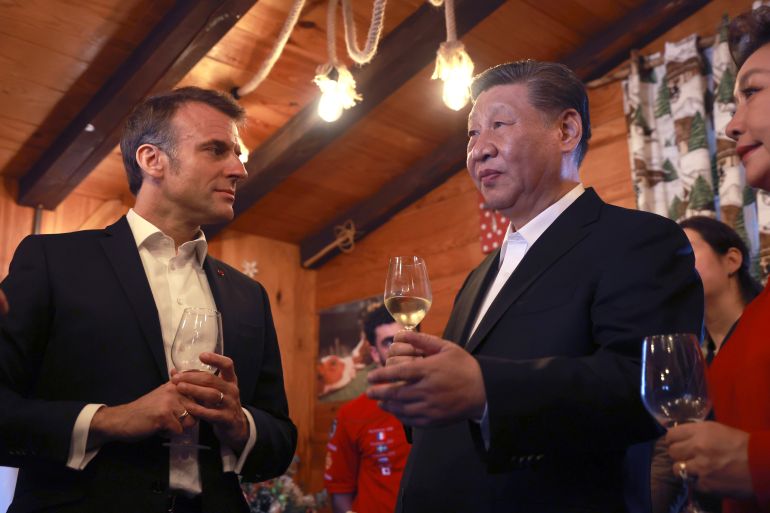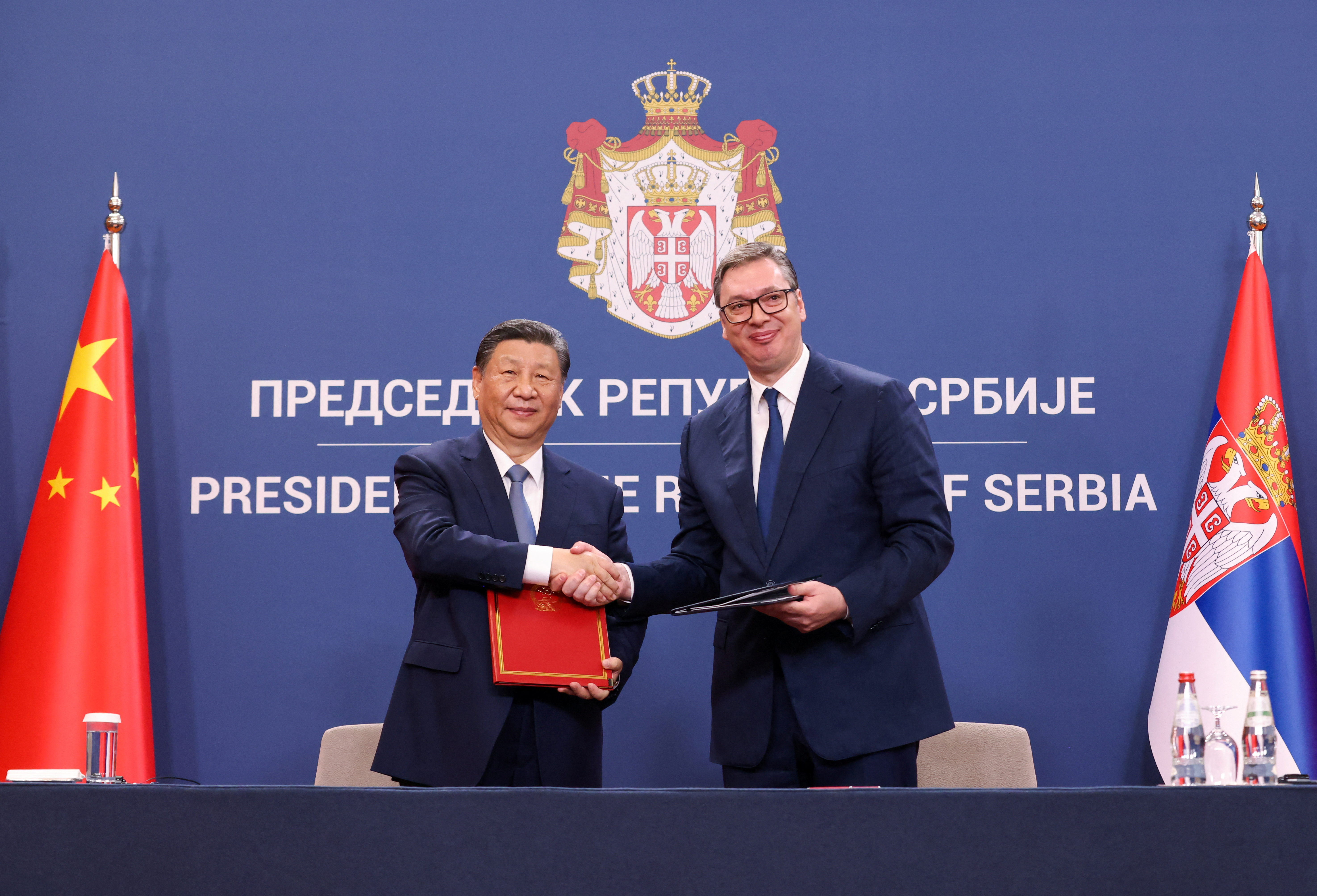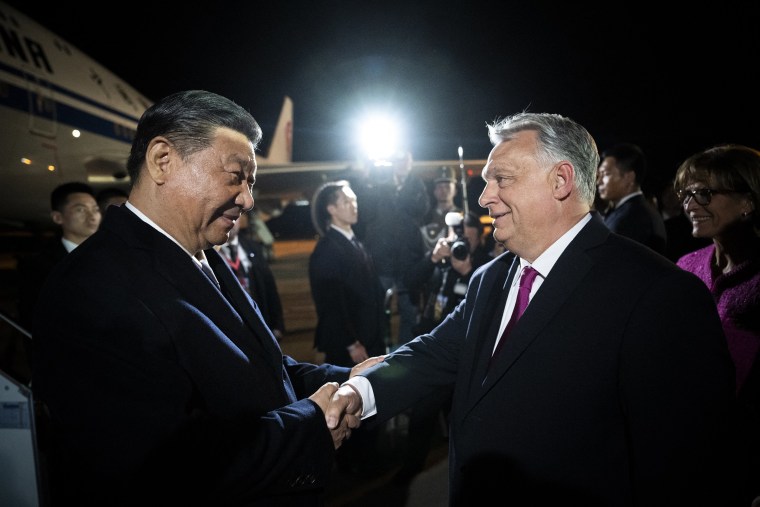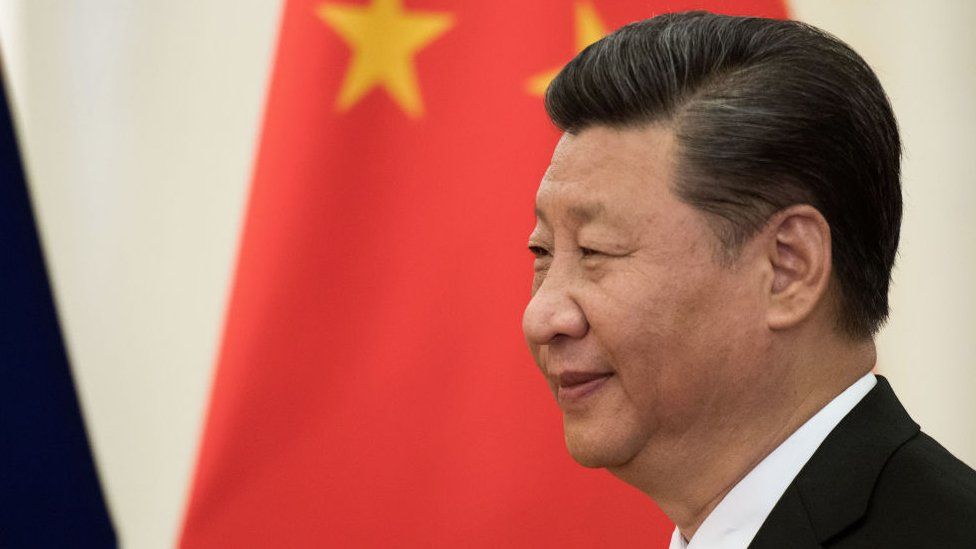China’s XI Jinping Out To Woe European Nations, With The 1st Tour In Five Years, What Is China Hoping For And How Will It Affect the United States?

China’s President Xi Jinping embarked on his first European tour in five years, spanning France, Hungary, and Serbia. His agenda centred on promoting China’s vision of a more multipolar world and engaging in discussions concerning trade, investments, and Russia’s actions in Ukraine.
However, Xi faces the challenge of repairing strained relations with Western Europe, particularly regarding his stance on the conflict in Ukraine and concerns over China’s expanding influence amidst tensions with the United States.
 Looking To Europe
Looking To Europe
Xi’s tour commenced in France, where President Emmanuel Macron welcomed him with symbolic gestures such as luxury cognac and a nostalgic visit to the Pyrenees mountains.
In Serbia, President Aleksandar Vucic orchestrated a grand reception, drawing large crowds chanting support for China in front of the presidential palace.
Likewise, in Hungary, President Tamas Sulyok and Prime Minister Viktor Orban extended a warm welcome, according Xi military honors at the Hungarian presidential palace.
This tour holds particular significance as Xi’s first European visit in half a decade, coinciding with important anniversaries in China’s relations with the three nations.
Notably, it aligns with the 60th and 75th diplomatic anniversaries with France and Hungary, respectively, alongside the 25th anniversary of NATO’s bombing of the Chinese embassy in Belgrade during the Kosovo conflict.
 Challenging United States
Challenging United States
Analysts perceive Xi’s primary objective during the tour as advocating for a world order less dominated by the United States while mitigating strains in China’s relationship with the European Union.
The urgency of addressing these diplomatic challenges and growing stronger ties between China and Europe comes amid heightened trade tensions, including the prospect of European tariffs and investigations into Chinese subsidies for electric vehicles.
France
During Xi Jinping’s two-day visit to France, President Macron emphasized the importance of addressing China’s trade imbalances with the EU, which amounted to a goods trade deficit of 292 billion euros ($314.72bn) last year, and urged Xi to leverage his influence with Russian President Vladimir Putin to resolve the conflict in Ukraine.
Macron invited European Commission President Ursula von der Leyen to join their discussions with Xi, accentuating European solidarity in seeking greater access to the Chinese market and addressing concerns about China’s surplus capacity in electric vehicles and green technology.
Likewise, it also urged Xi to regulate the sale of products and technologies to Russia that could serve both civilian and military purposes.
However, despite these efforts, Xi Jinping appeared reluctant to make significant concessions, dismissing the notion of a Chinese “overcapacity problem” and reiterating his call for negotiations to end the conflict between Russia and Ukraine.
Instead, with an upcoming meeting between Xi and Putin in China, Xi emphasized the importance of restarting contact and dialogue among all parties involved.
 What’s The Outcome Of The Visit
What’s The Outcome Of The Visit
Shirley Yu, a political economist and senior fellow at the London School of Economics, noted that Macron’s personal rapport with Xi might have deepened during the visit, aligning with Macron’s strategy to position France as a key partner to emerging global powers.
Yu spotlighted Macron and Xi’s shared vision for a multipolar world order, opposing US hegemony and advocating for accommodating the interests of rising powers like China.
Despite the absence of substantial concessions, French officials informed the media that Macron used the visit to convey messages regarding Ukraine, paving the way for more candid discussions in the future.
For Xi Jinping, Macron’s discussions on European “strategic autonomy” resonated with his vision for a multipolar world.
Although economic reconciliation was not apparent, Xi’s visit could help mitigate damage to China-Europe relations, amidst escalating tensions with the US over potential tariffs on Chinese goods and investigations into Chinese subsidies for electric vehicles.
Serbia
In contrast to Xi Jinping’s visit to France, his trips to Serbia, an EU candidate country, and Hungary, an EU member state, emphasized commitments to strengthen political relationships and increase investments in Eastern and Central Europe.
Both nations are involved in Xi’s ambitious Belt and Road Initiative, a vast infrastructure project aiming to link Asia, Africa, and Europe, and maintain close ties with Russia.
During his visit to Belgrade, Serbian President Vucic endorsed Xi’s vision of a “global community of shared future,” and the leaders celebrated an “ironclad partnership,” announcing the implementation of a free trade agreement signed between their countries last year, effective from July 1st.
Additional economic agreements included the initiation of new air routes and the importation of Serbian agricultural products.
 The Outcome Of the Visit
The Outcome Of the Visit
Shirley Yu, a political economist at LSE, interpreted Xi’s visit to Belgrade on the 25th anniversary of NATO’s bombing of the Chinese embassy as a message emphasizing China and Russia’s united stance against NATO’s eastern expansion.
She asserted that China’s refusal to limit economic collaboration with Russia emphasises its independence from Western pressure.
Hungary
In Budapest, Xi committed to further investments in transportation and energy infrastructure, such as the construction of a high-speed railway linking the city center to the airport and cooperation in the nuclear sector, as reported by Hungarian officials.
Xi also pledged advancement on a $2.1 billion project to connect Budapest with Belgrade, primarily funded through a loan from China, as part of the Belt and Road Initiative.
 The Outcome Of The Visit
The Outcome Of The Visit
According to Yu, this demonstrates Xi’s intent to elevate the “Second World” of the Cold War era into a significant geostrategic entity.
She believes that with China’s economic backing, peripheral EU countries can emerge as prominent players in the European economy, facilitating accelerated growth and the development of high-tech supply chains.
According to Yu, China views Hungary as a gateway to the EU trade bloc. She also suggested that China’s deepening partnership with Hungary could potentially undermine the effectiveness of EU sanctions on Chinese electric vehicles (EVs).
The Diplomatic Win
Regarding the broader context, Beijing and Paris are commemorating 60 years since establishing diplomatic relations, with France being the first Western nation to formally recognize the People’s Republic of China on January 27, 1964.
However, the visit occurs amidst a deteriorating global security, accentuated by the ongoing war in Ukraine, now in its third year, and the continuing bombardment of Gaza, resulting in at least 34,683 Palestinian casualties.
France has indicated that these conflicts, particularly the war in Ukraine where China has professed neutrality but refrained from condemning Moscow’s full-scale invasion, will be significant topics of discussion during the visit.
The Elysee Palace stated in a pre-visit announcement that exchanges would primarily focus on international crises, emphasizing the war in Ukraine and the situation in the Middle East.
Macron has recently emerged as one of the most assertive EU leaders on security matters, and he is expected to urge Xi Jinping to exert pressure on Russian President Vladimir Putin regarding the conflict in Ukraine.
In an interview, Macron stressed the existential threat posed by the war to Europe, expressing concerns about the potential implications of a Russian victory in Ukraine.
He emphasized the broader security implications for neighboring countries such as Moldova, Romania, Poland, Lithuania, and others, questioning the stability and security of the region in such a scenario.
Similarly, in the context of Serbia, Macron stated that he intends to communicate to Xi Jinping the importance of Europe to protect its own manufacturers and industries.
Before Xi’s departure last week, Lin Jian, a spokesperson for China’s Ministry of Foreign Affairs, expressed China’s readiness to collaborate with France and the EU, utilizing the meeting as an opportunity to enhance the strategic, stable, and constructive nature of China-EU relations.
They aim is to promote consistent progress in these relations, contributing to the prosperity of both China and Europe, as well as global peace.
 Hungary, The Vital Link
Hungary, The Vital Link
Regarding Hungary, a nation whose policies have sparked concerns among other EU members, there has been a noticeable alignment with Beijing and Moscow.
Recently, Hungary signed a security cooperation agreement with China allowing Chinese police officers to operate in areas densely populated by ethnic Chinese or frequented by Chinese tourists.
Reports on the establishment of Chinese police stations have raised concerns in other parts of Europe, particularly among exiles and dissidents.
Hungary’s involvement in China’s Belt and Road Initiative, joined in 2015, is likely to be a topic of discussion, including ongoing projects such as the high-speed rail link between Budapest and Belgrade.
 Ukraine War
Ukraine War
Concerning the war in Ukraine, Macron has increasingly emphasized the necessity for Europe to develop its own security framework rather than solely relying on NATO and the US.
He has even hinted at the possibility of France sending troops to Ukraine if Russia were to advance beyond the front lines and Kyiv sought assistance.
While China officially maintains neutrality in the conflict, its ties with Moscow have strengthened since the invasion began, with Putin’s upcoming visit to China signaling further cooperation between the two nations.
Macron aims to persuade Xi of the necessity for China to play a more active role in peace efforts, especially with Switzerland organizing a peace conference next month to discuss a 10-point plan proposed by Ukrainian President Volodymyr Zelenskyy at the end of 2022.
According to Swiss authorities, over 160 delegations have been invited to the conference, but it remains uncertain whether Beijing, which has also advocated for peace talks and dispatched its envoy to the region, will participate.
Russia has consistently rejected the peace process, insisting that Kyiv relinquish the 20 percent of its territory currently under Russian occupation as a prerequisite for negotiations.
An unnamed diplomatic source quoted by the French newspaper Le Monde emphasized the importance of continuing to engage China, given its significant influence in persuading Moscow to reconsider its stance.
While Chinese state media enthusiastically cover Xi’s arrival in Paris, showcasing streets adorned with Chinese and French flags and Chinese nationals welcoming their president, activists for Tibet and Xinjiang also took to the streets of the capital.
The EU’s imposition of targeted sanctions on specific Chinese officials and companies in response to the situation in Xinjiang in March 2021 has elicited strong reactions from Beijing.
 The Significance Of China Closing Up To EU
The Significance Of China Closing Up To EU
China’s visits to countries like France, Serbia, and Hungary hold significant importance on multiple fronts.
First, they represent China’s strategic efforts to expand its economic and political influence globally, particularly in regions like Eastern and Central Europe.
Second, these visits facilitate deeper engagement with key players in the EU, potentially opening doors for increased trade, investment, and infrastructure development, as evidenced by China’s involvement in initiatives like the Belt and Road Initiative.
From the perspective of growing Russia-China relations, these visits emphasise the strengthening partnership between the two nations.
As China seeks to bolster its presence in Europe, it aligns closely with Russia’s interests, especially amid tensions with the United States and NATO.
Both China and Russia share common objectives in challenging US dominance and promoting a more multipolar world order. Therefore, China’s engagement with countries like Hungary, which have also fostered closer ties with Moscow, reinforces the strategic alignment between China and Russia.
 United States
United States
In contrast, these developments present challenges for the United States. As China strengthens its presence in Europe and deepens cooperation with Russia, it poses a challenge to US influence in the region.
The growing Russia-China axis presents an alternative power bloc that challenges US hegemony, potentially reshaping global geopolitics.
Additionally, China’s expanding economic footprint in Europe could strain transatlantic relations, particularly as the US seeks to assert its influence and address concerns over issues such as trade imbalances, technology transfer, and human rights.
The Last Bit, China’s visits to these countries signify its ambitions for global leadership and its growing partnership with Russia, posing both opportunities and challenges for the United States as it balances evolving geopolitical dynamics.




